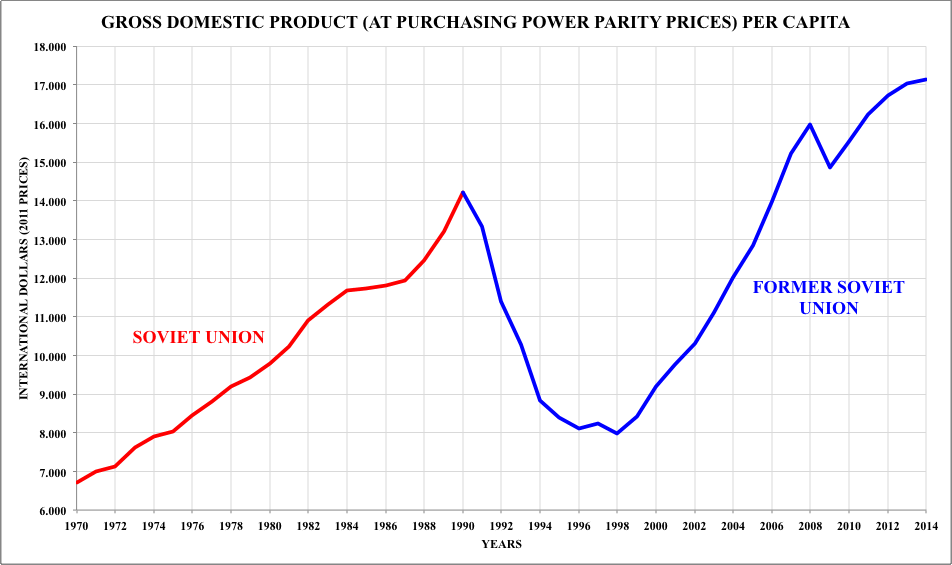A lot of communist rhetoric centers on the fact that the living conditions for citizens in the former Russian empire and Cuba improved thanks to the socialist governments that were put in place. The truth is, these improvements were largely the results of a worldwide trend in improved living standards rather than the leadership outperforming expectations. In fact, in many cases Russia and Cuba fell behind their contemporaries but first, let’s establish some background
In the eve of the Russian Revolution, the Russian empire was not some “third world country” By modern (and even then west European) standards, it was a pretty lame place to live. But that’s literally comparing it to the very richest countries. In reality, the Russian empire had one of the top 7 economies in the world (with Russia proper actually having a larger economy than France proper). “But what about per capita?” In that case, in 1913, Russia had a larger gdp per capita than Japan, Greece, Portugal, and Iran. At that time, it’s per capita figures were 3,040, with it actually shrinking to 2,979 by 1929. But that was on the heels of a civil war, so to give them the benefit of the doubt, we’ll look at their massive improvement to 4,634 by 1939.
By that time Greece had gone from 2,264 to 5,327. Oh well, they didn’t have a civil war (they just had a regular war) so unfair comparison. Ok. In that case, we’ll compare the growth of the Soviet gdp per capita between 1960 and 1973 with the countries it is as ahead of. In this time period, the Soviet Union had largely found its footing, created its satellite bloc and had international community of fellow socialist nations to trade with. In many cases it was the golden age of the country. Well during this age, the gdp for the Union as a whole rose from 8,481 to 13,026. For Russia alone it was 8,972 to 16,939 Again rather impressive, until you see what other countries achieved.
War torn Japan went from 6,273 to 17,993
Borderline Fascist Portugal went from 5,115 to 12,222
Iran went from 6,003 to 15,205
Greece went from 6,052 to 14,727
Venezuela went from 5,913 to 17,529.While Greece, Iran, and Portugal are still below Russia proper 1. They had been for the past century. 2. They each showed much higher growth than the Soviets in comparison to starting point. On top of all that, even during the Soviets massive growth, they still never exceeded the Western European countries that socialists were comparing the Russian empire with anyway. There are countries that performed far worse than the Soviet Union economically, but in no way is the centrally planned model the most effective one
(These economic figures come from The Maddison Project in 2011 dollars, so if you want to deny them based on being from “capitalist sources” then go ahead, but keep in mind that by doing so you should have sources that are not from the Soviet government itself or something.)
When it comes to literacy, the Soviet rate went from 32% in 1920 to 75% by 1937 according to the census. Once again in borderline fascist Portugal it went from 39.2% to 59.6% between 1930 and 1950. Not quite as impressive, but while the Soviets focused on educating the entire population, the Portuguese focused on educating the children strictly, with the literacy rate for children going from 33% to 77% in the same time period. That’s not to say the Soviets obviously didn’t have a better approach, just that mass literacy campaigns are not a product of socialism as much as it is an active government.
On to Cuba, the common perception that socialist like to say is that it used to be some poor illiterate U.S. colony until Castro kicked the “slave owners out” and now in-spite of US sanctions, the Cuban economy continues to thrive. Many things wrong about this characterization. The truth is, before the revolution, Cuba was already one of the leading countries in Latin America. It had a lower infant birth mortality than Japan. The gdp per capita of Cuba since then has slugged behind some of its former contemporaries, only rising from 4,360 to 50,763 in the same 1960 to 1973 time period.

Now socialists are quick to blame U.S. sanctions but a more adequate explanation is the general failure of central planning. Despite U.S. sanctions, Cuba was free to trade not only with the entire socialist world, but also any country that wasn’t America. Even though the U.S. government tried to threaten other countries from not trading with Cuba, these measures were unsuccessful, in fact even Western European countries engage in trade with Cuba then and now. On top of that, the Soviet Union was subsidizing Cuban sugar at the time at a level that far exceeded the negative value on the loss of American trade. The loss of the Soviet Union sent the economy on a downturn in the 90s, but even during its heyday its success could not be attributed to the policies of a centrally planned economy.

The last point to go over is the myth that Cuban Americans are all slave owners. The truth is there are three waves of immigration, the first wave was shortly after Castro took power from 1959 to 1962 and it saw the exit of the mostly lighter skinned upper and middle class. That was 248,000 people. After that there was the freedom flights between 1865 and 1973, the majority of whom were salespeople, small farmers and semi skilled workers. These amounted to 260,600 people. Then there was the wave of Mariel Cuban immigrants in 1980 which consisted of around 124,800 mostly working class young Cuban men. In 1994 another small wave of light skinned, educated men came through, this time around 30,900. Finally around 649,700 Cubans have immigrated to the U.S. since 1995 and these immigrants are largely from the lower and middle parts of society. In total there are now over 1.3 million Cubans in the United Stares, of which only a small minority consist of the “golden exiles” from the initial period following the revolution.
Socialist rhetoric depends on the idea that these emigrants are largely rich capitalist slave owners who left because there was no stake in the country if they couldn’t continue exploiting the people, but the truth is a large number of these immigrants are the very working class that were supposed to benefit from the revolution.
The point of making this thread has not been to convince communists of anything. They are lost. It is so that people who are on the fence but somewhat sympathetic to socialist ideologies do not fall for their lies. In particular, I made this thread after seeing @EuroNymous credit Stalin for transforming the Soviet Union. If he had actually been a socialist this thread wouldn’t exist, but given that he denounced Stalin the next post I figure there’s still some time left to change some minds. At the end of the day it is true that Castro and Stalin improved various aspects of life for the Soviets and the Cuban people, but to act as though their achievements were worth the cost or as if what they did was in anyway impressive compared to the their contemporaries would be to ignore the historical realities of the time. I don’t think that communism necessarily has to be a death sentence for any country that adopts it, but it is clearly not a model worth pursuing or admiring for future social or economic planning.
 KOL Meezy Mestizo
KOL Meezy MestizoSynopsis about to bonkers in this thread
He has me muted like a loser. I doubt he’ll see it
this man is talking about GDP PER CAPITA IN THE RUSSIAN EMPORE LIKE VALUE WAS ACTUALLY EQUALLY DISTRIBUTED ACROSS CAPITA

gdp per capita is useless in gauging the economic strength of a country where wealth is unequally distributed
 americana
americanathis man is talking about GDP PER CAPITA IN THE RUSSIAN EMPORE LIKE VALUE WAS ACTUALLY EQUALLY DISTRIBUTED ACROSS CAPITA

gdp per capita is useless in gauging the economic strength of a country where wealth is unequally distributed
No it’s not, it measures the productivity of a country. It’s one of the most accurate measures for an economy’s health. In fact, I see it being used by communists all the time (when it makes them look good)

 KOL Meezy Mestizo
KOL Meezy MestizoSynopsis about to bonkers in this thread
Synopsis avoids a well-thought out argument. He’ll blank this thread and go find an uninformed teenager to dunk on.
now this is speaking my language
central planning sucks s***, commies can cope
OP woke up and decided to ether half the section
 Buckleys Angel
Buckleys AngelSynopsis avoids a well-thought out argument. He’ll blank this thread and go find an uninformed teenager to dunk on.
yeah the moment you come at him with knowledge he shrinks away
 americana
americanathis man is talking about GDP PER CAPITA IN THE RUSSIAN EMPORE LIKE VALUE WAS ACTUALLY EQUALLY DISTRIBUTED ACROSS CAPITA

gdp per capita is useless in gauging the economic strength of a country where wealth is unequally distributed
Wrong
GDP per capita is still important
Even highly unequal societies with high GDP per capita on average will have the poorest be better off than those with low gdp per capita and a more equitable distribution
 americana
americanathis man is talking about GDP PER CAPITA IN THE RUSSIAN EMPORE LIKE VALUE WAS ACTUALLY EQUALLY DISTRIBUTED ACROSS CAPITA

gdp per capita is useless in gauging the economic strength of a country where wealth is unequally distributed
On top of my earlier response, inequality in the Russian Empire was about the same as inequality in the United States now.

Gdp per capita for U.S. in 2015 was 56,839
Idk if you ever lived in America but that sounds like the average income to me. But just to back it up with data the median wage for wage earners in for the second quarter of 2015 was 801 a week. That means around 41,000 year. While lower than the gdp per capita, it is still well within its ballpark.
If we assume that the 1913 figure for Russia’s gdp per capita is as distorted as the U.S. gdp per capita (despite having less income inequality than america by then) yet somehow the other countries I listed with lower gdps than Russia are completely undistorted compared to actual wages for some reason then the earlier 3,040 becomes 2,219, which is still higher than Japan and Portugal. No matter how you put it, the Russian empire was not some “backwater country” before the revolution, it was behind Western Europe and The US, which it has remained since after the revolution TragedyBerlusconi
TragedyBerlusconinow this is speaking my language
central planning sucks s***, commies can cope
OP woke up and decided to ether half the section
I see you keeping up there good fight while I was gone. Well done
 Enpax
EnpaxI see you keeping up there good fight while I was gone. Well done
It's not even capitalism vs socialism
I'm sympathetic to co ops and market socialist idea. The real enemy is bureaucracy and authoritarianism
 Cudderwalks
Cudderwalks
The highest standard of living countries ever are not communist. That is Scandinavia
It's also easy to grow that much when you start from a worse position
The Soviet union did have homelessness it's just it was harder to record.
 TragedyBerlusconi
TragedyBerlusconiThe highest standard of living countries ever are not communist. That is Scandinavia
It's also easy to grow that much when you start from a worse position
The Soviet union did have homelessness it's just it was harder to record.
I would never claim Communist countries were perfect or a paradise.
Or that the Soviet Union had an amazing economy, that nothing bad ever happened.
But they were able to find a stable job and a place to live for almost every single one of it's citizens.
Many of these countries were insanely progressive for their times, even outpacing current day countries on things such as gender equality.
bruh....
 Russia ain't undergo an insane industrial change in a short period of time that led them to be able to help win WWII for the allies and s*** on hitler?
Russia ain't undergo an insane industrial change in a short period of time that led them to be able to help win WWII for the allies and s*** on hitler? Enpax
EnpaxNo it’s not, it measures the productivity of a country. It’s one of the most accurate measures for an economy’s health. In fact, I see it being used by communists all the time (when it makes them look good)

productivity is not a good indication of economic health either
america is one of the most productive countries in the world (once again on a per capita basis) and people cannot afford health care, afford houses, and is rife with people who are working to make ends that can't meet because they are not being paid fairly
 6isco 🦈Mar 28, 2021·1 reply
6isco 🦈Mar 28, 2021·1 replywho actually read all that?
 TragedyBerlusconi
TragedyBerlusconiWrong
GDP per capita is still important
Even highly unequal societies with high GDP per capita on average will have the poorest be better off than those with low gdp per capita and a more equitable distribution
so you're saying that it doesn't matter where the money is in a society, even when there is massive disparity between the two extremes to the point of the poorer end experiencing food insecurity and starvation, as long as the "average" is high (when the reality of the situation is that said average is meaningless because it doesn't reflect what the layman actually can do)? What kind of positive is there to not being able to properly distribute resources of value to people equally to meet material needs?
